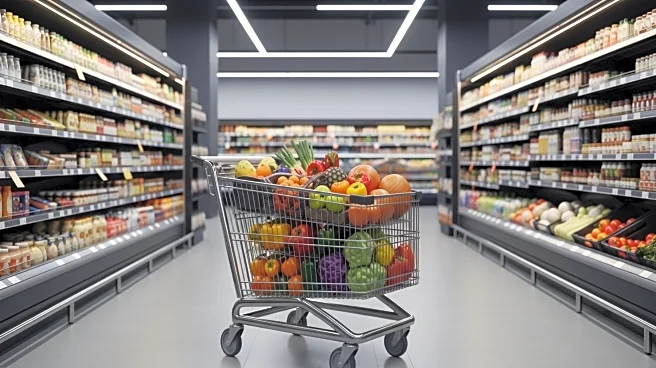What's Happening?
Amazon has introduced a new private label brand called Amazon Grocery, consolidating its existing Amazon Fresh and Happy Belly brands under one banner. This new brand features over 1,000 food items, including dairy, fresh produce, meat, seafood, snacks, and baking essentials, with most products priced under $5. The launch is part of Amazon's strategy to strengthen its position in the grocery sector, which already includes significant sales from Whole Foods Market and Amazon Fresh. Amazon Grocery products are available on Amazon.com and at Amazon Fresh locations, both online and in stores. The move follows Amazon's expansion of same-day fresh food delivery nationwide in August.
Why It's Important?
The introduction of Amazon Grocery is significant as it reflects a growing trend among retailers to emphasize private label brands, which are increasingly popular among cost-conscious consumers. Private label brands accounted for a substantial portion of grocery sales in the U.S. last year, and Amazon's move is likely to enhance its competitiveness against major players like Costco and Walmart. By offering high-quality products at lower prices, Amazon aims to attract more customers and increase brand loyalty. This strategy is particularly relevant in the current economic climate, where inflation and tariffs are driving up food prices, making affordable private label options more appealing.
What's Next?
Amazon is expected to continue expanding its Amazon Grocery product lineup, with new items such as fresh bakery cinnamon rolls, refrigerated pizza dough, and frozen pasta meals set to be introduced. The timing of the launch, just before Amazon's Prime Big Deal Days event, suggests potential promotions and deals that could boost interest and sales. Additionally, Amazon Grocery products may become more prominent in shoppers' online carts during other Amazon purchases, further integrating the brand into consumers' shopping habits.
Beyond the Headlines
Amazon's focus on private label branding aligns with a broader shift in consumer sentiment, where private labels are shedding their down-market stigma. This trend is driven by the need for affordable options amid rising prices, and retailers are increasingly highlighting their private label brands to build consumer loyalty. Amazon's efforts to reduce plastic usage in packaging also reflect its commitment to sustainability, which could enhance its appeal to environmentally conscious consumers.











